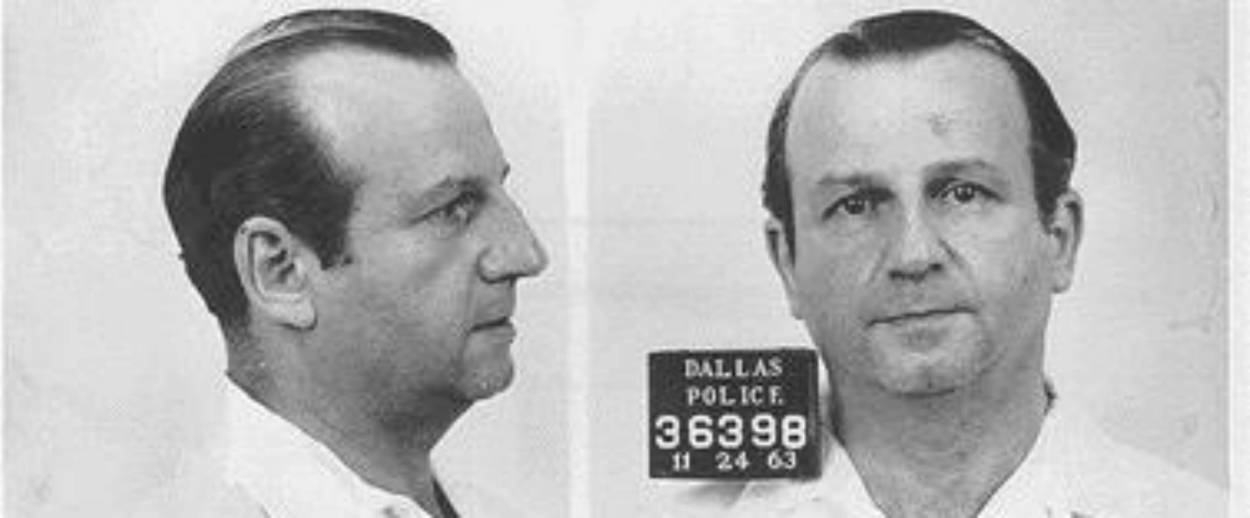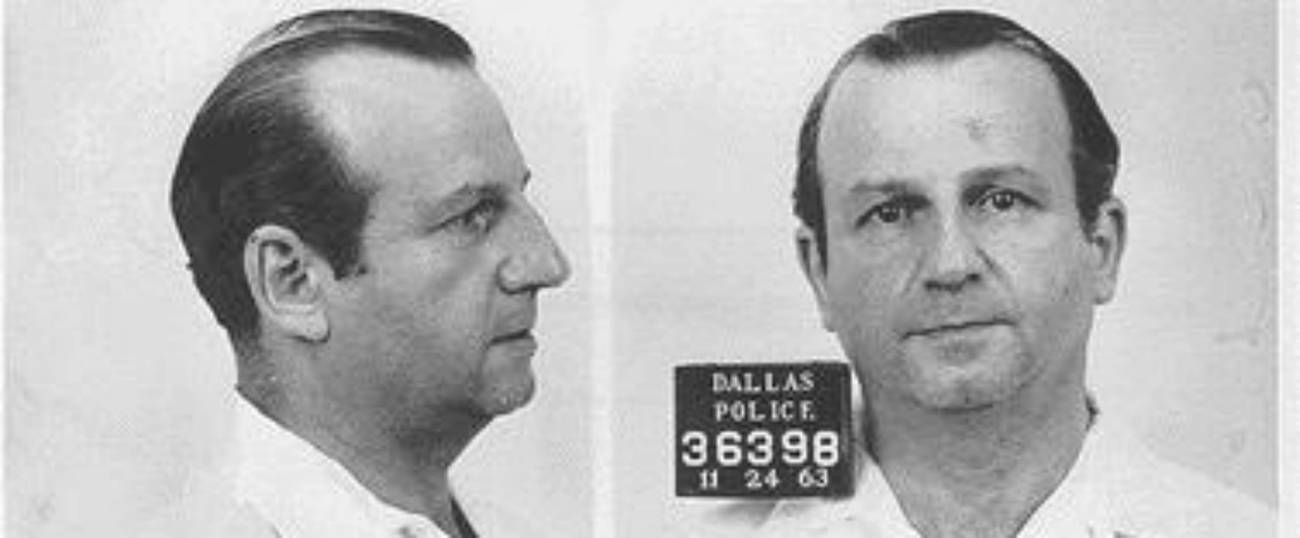Inside Jack Ruby’s Jewish Paranoia
There was more than just patriotic vengeance motivating the man who killed Kennedy’s assassin




When news reached the White House on Nov. 22, 1963, that Lee Harvey Oswald had assassinated President John F. Kennedy, then-Assistant Secretary of Labor Daniel Patrick Moynihan may have been the only person who talked sense. Once he heard the news that Oswald was not a far-right John Bircher but a Communist Fidel Castro enthusiast, Moynihan said that the right-wing “Texans” would murder him. He implored the White House to get Oswald out of Dallas. Though Moynihan didn’t believe in any kind of secret plot behind Kennedy’s death, he warned that if Oswald were murdered it would convince Americans that there was indeed a conspiracy. No one listened.
If there is one matter that the Grassy Knoll conspiracists can agree on with their hated Warren Commission it’s that Jack Ruby, a Dallas strip-club owner, killed Oswald two days after Kennedy’s assassination. Ruby pulled the triggers on his .38 Colt revolver in the basement of the Dallas Police Department as Oswald was being transported to a county jail.
The murder gave Ruby the historical importance he always craved as his actions indeed begat and nourished various and wildly divergent conspiracy groups. Without the notoriety from killing Oswald, Ruby, a small timer with vague links to organized crime, would have gone unnoticed by history.
But even the most reasonable of the conspiracy groups saw Ruby as more than that. To the House Assassination Committee, tasked with re-investigating the assassination supposedly solved by the Warren Commission, Ruby was ordered to “hit” Oswald by the same organized crime element that had killed JFK. Others magnified Ruby’s role even further, claiming that he killed Oswald on orders from his CIA controllers.
It is difficult to see how either the mob or the CIA could have trust Ruby with such a task group, for, indeed, he was as his close friends said, “a born loser” with a big mouth. His actions leading up to shooting Oswald did not seem coordinated or planned. Had Oswald not requested a sweater, delaying the announced transfer by 30 minutes, Ruby would have missed him altogether.
As he was being scuffled to the ground by the police, Ruby proclaimed patriotic reasons for gut-shooting Oswald. He told arresting officers he murdered Kennedy’s assassin to avenge “my president.”
Naively, Ruby thought this action would make him a hero, and thus, he believed, according to Dallas Assistant District Attorney Bill Alexander he would only “spend a night in jail.” That he left his beloved dogs in his car implies he may have thought it would be even shorter.
But there was another motivation rarely mentioned by either side for Ruby’s actions. It stemmed from a personality formed in the Jewish section of Chicago where he was raised.
Jacob Leon Rubenstein was born on March 25, 1911, to Joseph Rubenstein and Fannie Rutkowski, both immigrants from Poland who lived in the Jewish section of Chicago. According to Ruby’s sister Eva, the area was “below middle class but yet it wasn’t the poorest class.”
The fifth of the couple’s ten children, Ruby had a much more dysfunctional childhood than Lee Harvey Oswald. Whereas Oswald had to cope with a self-pitying drama queen mother, Ruby was exposed to his parents hitting each other. The couple often separated and eventually Ruby’s mother was committed to a mental institution.
Ignored by his parents, Ruby skipped school, was arrested for truancy and spent considerable time in foster homes. It was in his early years that he developed the hair-trigger temper others would witness when he was an adult. This was expressed in numerous street battles with Italians nearby neighborhoods. During his time at a foster home, the Institute for Juvenile Research conducted a psychiatric examination of the child. Noting his “quick” temper, the psychiatrists were told by Ruby that “he can lick everyone and anybody in anything he wants to do.”
His anger was frequently expressed over what he saw as anti-Semitic slurs. Drafted into the Army Air Corp in 1943, Ruby, according to biographer Seth Kantor, once beat up a sergeant for calling him a “Jew bastard.” He returned to Chicago after being discharged in 1946, and according to conspiracy groups, was an errand runner for Al Capone’s cousin and trigger-man Frank Nitti; an assertion that Ruby’s family denied. His sister claimed that Ruby was selling oak baskets in this period.
In 1947 Jacob Rubenstein moved to Dallas and that same year legally changed his name to Jack L. Ruby. According to some accounts, the purpose of the move was for Ruby to convince Dallas County Sheriff Steve Gutherie to allow a mob presence in the city. What is verifiable from this time period was Ruby’s arrest record. Already a strip-club owner, Ruby, between 1949—1963 was arrested 8 times by the Dallas Police. Among the charges was disturbing the peace, carrying a concealed weapon, and assault (the latter charge was dismissed).
Despite never being convicted of the crime, it appears that Ruby did commit assaults when stepping in as a bouncer in his own club. According to his Dallas Rabbi, Hillel Silverman, who observed Ruby on numerous occasions saying Kaddish for his father, Ruby once showed up in an arm cast. He told Silverman this was a result of him bouncing a rowdy patron out of his club.
What those who knew Ruby before the Kennedy Assassination all agreed on was his mental imbalance. One of the strippers who worked for him, Janet “Jada” Comforto, stated that she believed her boss wasn’t “sane.” Edward Pullman, whose wife was employed by Ruby, seconded this view, calling him a “psycho.”
Often overlooked or unmentioned in the motives assigned to Ruby as to why he murdered Oswald was that Ruby saw himself as a protector of his fellow Jews. When Rabbi Silverman visited Ruby in prison, Ruby told him it wasn’t just patriotism that motivated him: “I did it for the Jewish people,” he told the rabbi.
Ruby, initially receiving a death sentence, explained this motivation during a bizarre visit with the Warren Commission in his prison cell.
The Oliver Stone school of conspiracy theory has cherry-picked his testimony. They focus on Ruby’s statements supporting a conspiracy. Frequently during the interview, Ruby told Chief Justice Earl Warren that his “life was in danger here” in Dallas, and that he could only tell the truth if taken to Washington. But their most cherished statement is the following:
“Consequently, a whole new form of government is going to take over the country, and I won’t live to see you another time.”
But Ruby was not warning about any military-industrial complex junta. For him, this “new form of government” was an anti-Semitic one, which was already (as he voiced in the sentence immediately preceding the cherry-picked one) engaged in exterminating the “Jewish people.” In other parts of the testimony, Ruby claimed this form of government had not yet arrived and its ascendancy was dependent upon Ruby proving he was not part of some Jewish plot that killed Kennedy:
“{I am being} used as a scapegoat, and there is no greater weapon that you can use to create some falsehood about some of the Jewish faith, especially at the terrible heinous crime such as the killing of President Kennedy.”
For Ruby, the threat to his life was local. It was the Dallas chapter of the ultra-right John Birch Society, who at the time was indeed advancing the assertion that Ruby and his “fellow Jews” had murdered JFK. It was because of them, that Ruby feared for his life and his reason for wanting to be taken to Washington for further testimony. There, he asserted, he could prove via a lie detector test that he was not involved in a plot and thus invalidate the Bircher theory. To do so, according to Ruby would save “my people” from “torture and mutilation.”
Toward the end, Ruby died of cancer in 1967, he became wildly incoherent. But the one consistent thing was his paranoid belief that Jews were being exterminated. During a visit with his nephew, he stated that the police were “torturing Jews in the basement.” In a visit with Ruby, he told Rabbi Silverman to “duck underneath the table. They’re pouring oil on Jews and setting them on fire.”
Ruby talked throughout his life about his ambition to be the “center of attention.” Whether he killed Oswald to avenge Kennedy, defend his fellow Jews, or for some other muddled set of reasons, it finally got him the recognition he craved.
Ron Capshaw is a writer living in Midlothian, Va.